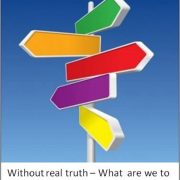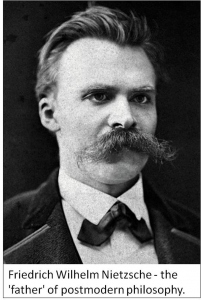Postmodernism vs The Bible and Truth
| Postmodernism vs. The Bible and Truth The Western media is full of an ideology called “Postmodernism”, but how does this stack up against the Bible’s teaching on “Truth”? The ‘Postmodern’ Worldview Post modernism is hard to define. It is a movement, a mood, a world view which has been gaining popularity in the last 30 years. The Effect of Postmodernist Views Post modernists say that language is simply the labels that the powerful in society have used to impose their truth on the masses. For this reason, “political correctness” is now high on the news agenda to ensure anyone who uses language which might suppress or impose their culture on others is brought to account. Post modernists say that the law has been used as the mechanism to maintain power by the dominant cultures of society. Law is now used to attempt to rebalance this as the recent case about Ashers Bakery highlighted (This was about a UK judge ruling against Ashers Bakery on refusal to bake a cake promoting gay marriage.) The bakery had refused to print an anti-homosexual marriage message on a cake because it was against the owners’ Christian values – and the government pursued and fined them for so doing. This is postmodern in that the law is being used to ‘rebalance society’ and include those groups who are perceived as have been historically oppressed. Post modernists say that History and Literature have been written by the victorious who are all bias because of their culture. So we find that in academic circles texts are “deconstructed” to reveal these biases. One of the most common is to look at Shakespeare and deconstruct his stories to seek to reveal how he was sexist. They go even further too. It is suggested that society, as we think of it, is a human construction. That it is based, not on right and wrong, but based on what the powerful have wanted us to believe. The Death of “Truth” Truth, they say, is therefore subjective, depending on your culture and upbringing. They believe man is trapped inside his culture prison, never to escape. Therefore, instead of seeking truth, we should focus on what feels right. What emotion connects with us as individuals. “If it feels good it’s true for you”.
Many of the ideas of postmodernism can be traced back to a German Philosopher called Friedrich Nietzsche (pronounced ‘knee-cha’). These quotes from him help to define the mindset: This view is now permeating through most of society in the West, especially when it comes to the big questions of life. The quest for truth has been given up on. No longer do we see proper debates on fundamental topics. It is now unpopular to put a view across which dares to say others are wrong. What we are witnessing is: ‘the death of truth’. It’s a new wave of human thought and it is a powerful one affecting many areas of Western society. The Bible and “Truth” The Bible teaches that man is indeed in an unreliable state. “The heart is deceitful above all things, and desperately wicked: who can know it?
“we read in Jeremiah 17:9 The Bible presents God as the source of all truth. “A God of truth and without iniquity, just and right is he…” we read in Deuteronomy 32:4. His word the Bible is defined as “the scripture of truth” in Daniel 10:21 and Jesus says that God’s word “is truth” in John 17:17. The Bible claims to be penned by men and woman who were compelled to write down words directly from God in a process the bible calls “inspiration”. Therefore, although it may be beyond humans to discover Truth of themselves the Bible offers a way in which we can perceive a universal Truth. That “truth” is the self-expression of God. “Truth” is that which is consistent with the mind, will, character, glory, and being of God. That “truth” is found alone in God’s word. By Matt Davies |
![]()



 We should never impose our truth on others, because, say they, for all truth is equal and valid.
We should never impose our truth on others, because, say they, for all truth is equal and valid.